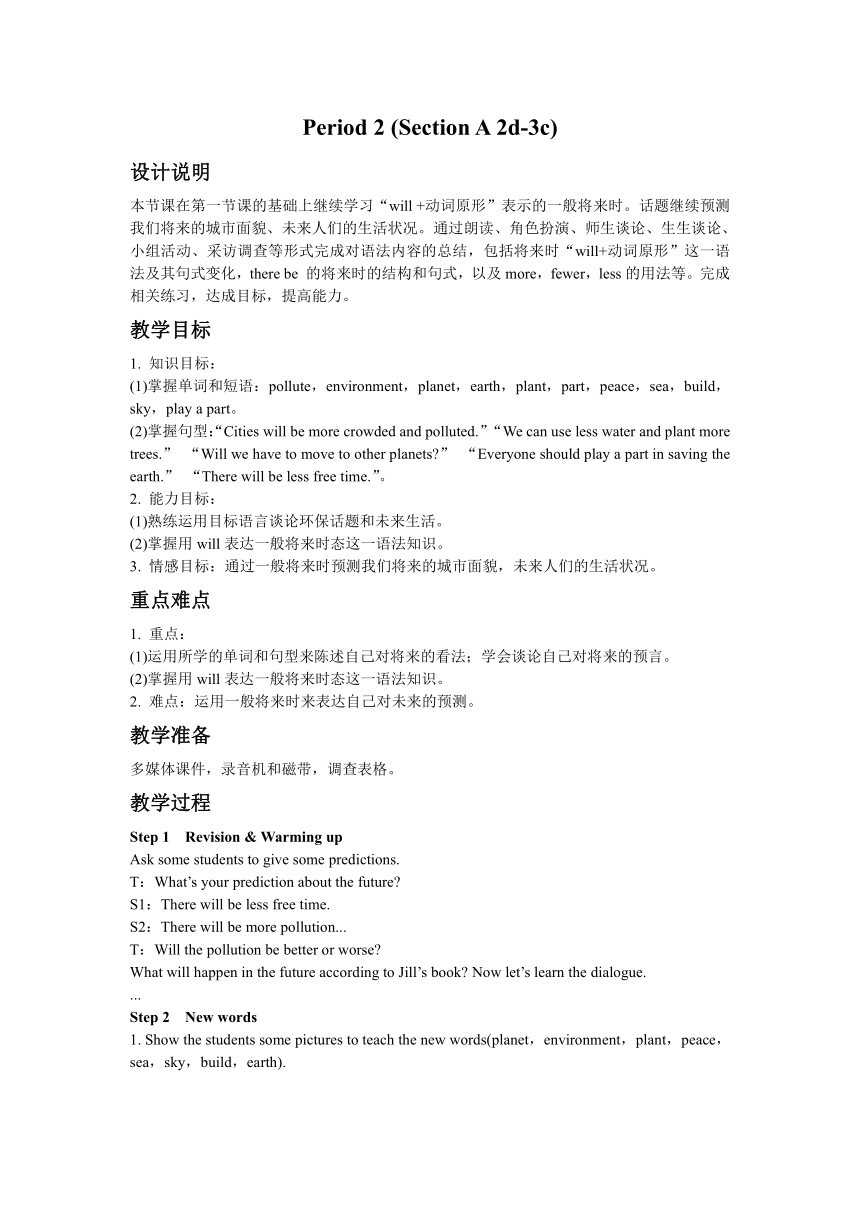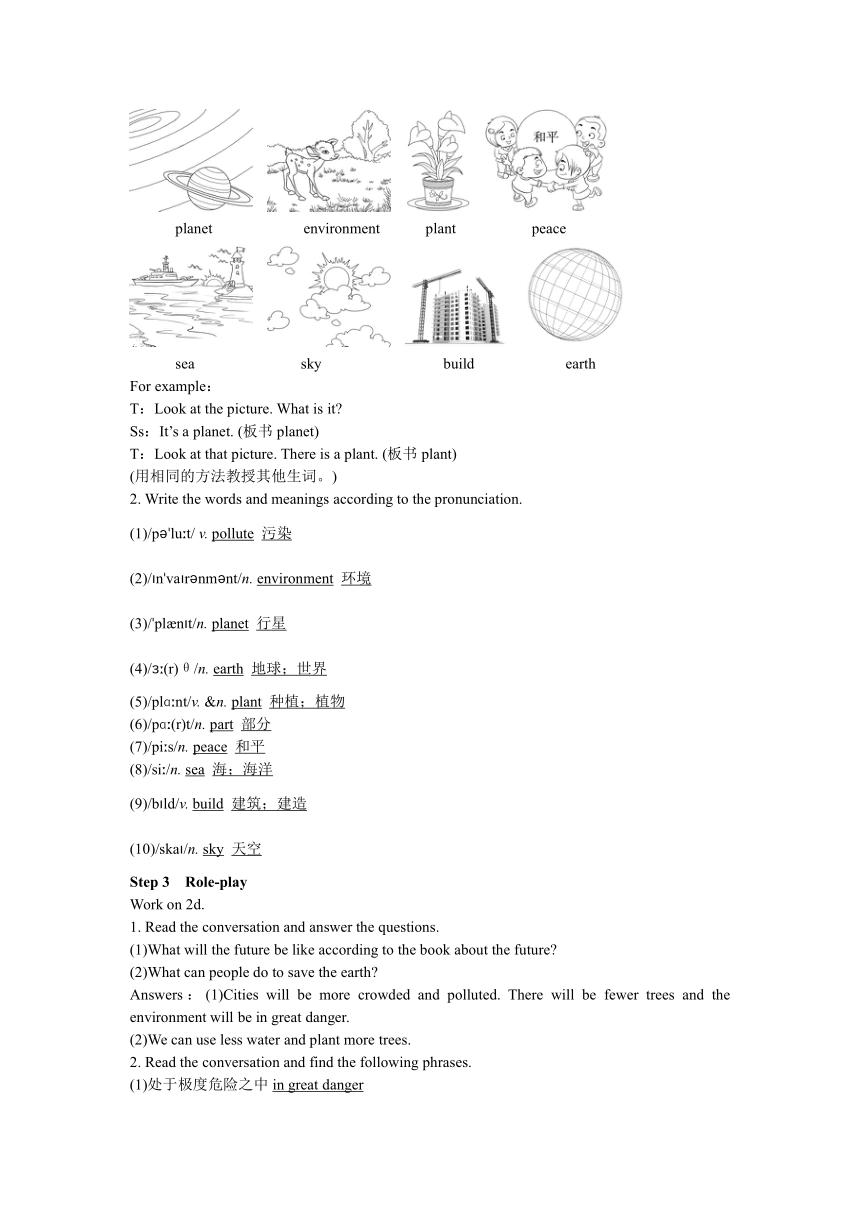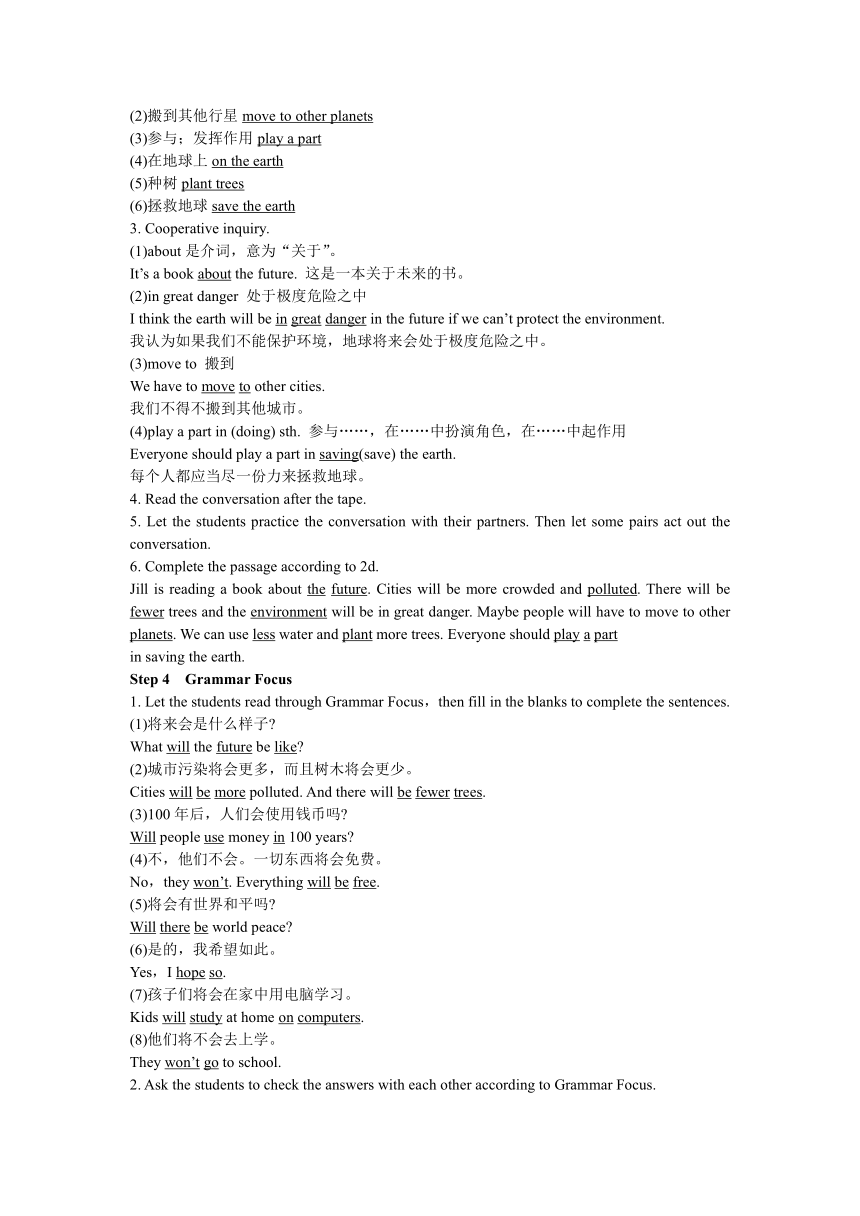Unit 7 Will people have robots? Period 2 (Section A 2d-3c)教案
文档属性
| 名称 | Unit 7 Will people have robots? Period 2 (Section A 2d-3c)教案 |

|
|
| 格式 | docx | ||
| 文件大小 | 133.7KB | ||
| 资源类型 | 教案 | ||
| 版本资源 | 人教新目标(Go for it)版 | ||
| 科目 | 英语 | ||
| 更新时间 | 2022-07-25 00:00:00 | ||
图片预览



文档简介
Period 2 (Section A 2d-3c)
设计说明
本节课在第一节课的基础上继续学习“will +动词原形”表示的一般将来时。话题继续预测我们将来的城市面貌、未来人们的生活状况。通过朗读、角色扮演、师生谈论、生生谈论、小组活动、采访调查等形式完成对语法内容的总结,包括将来时“will+动词原形”这一语法及其句式变化,there be 的将来时的结构和句式,以及more,fewer,less的用法等。完成相关练习,达成目标,提高能力。
教学目标
1. 知识目标:
(1)掌握单词和短语:pollute,environment,planet,earth,plant,part,peace,sea,build,sky,play a part。
(2)掌握句型:“Cities will be more crowded and polluted.” “We can use less water and plant more trees.” “Will we have to move to other planets ” “Everyone should play a part in saving the earth.” “There will be less free time.”。
2. 能力目标:
(1)熟练运用目标语言谈论环保话题和未来生活。
(2)掌握用will表达一般将来时态这一语法知识。
3. 情感目标:通过一般将来时预测我们将来的城市面貌,未来人们的生活状况。
重点难点
1. 重点:
(1)运用所学的单词和句型来陈述自己对将来的看法;学会谈论自己对将来的预言。
(2)掌握用will表达一般将来时态这一语法知识。
2. 难点:运用一般将来时来表达自己对未来的预测。
教学准备
多媒体课件,录音机和磁带,调查表格。
教学过程
Step 1 Revision & Warming up
Ask some students to give some predictions.
T:What’s your prediction about the future
S1:There will be less free time.
S2:There will be more pollution...
T:Will the pollution be better or worse
What will happen in the future according to Jill’s book Now let’s learn the dialogue.
...
Step 2 New words
1. Show the students some pictures to teach the new words(planet,environment,plant,peace,sea,sky,build,earth).
planet environment plant peace
sea sky build earth
For example:
T:Look at the picture. What is it
Ss:It’s a planet. (板书planet)
T:Look at that picture. There is a plant. (板书plant)
(用相同的方法教授其他生词。)
2. Write the words and meanings according to the pronunciation.
(1)/p lu t/ v. pollute 污染
(2)/ n va r nm nt/n. environment 环境
(3)/ pl n t/n. planet 行星
(4)/ (r)θ/n. earth 地球;世界
(5)/plɑ nt/v. &n. plant 种植;植物
(6)/pɑ (r)t/n. part 部分
(7)/pi s/n. peace 和平
(8)/si /n. sea 海;海洋
(9)/b ld/v. build 建筑;建造
(10)/ska /n. sky 天空
Step 3 Role-play
Work on 2d.
1. Read the conversation and answer the questions.
(1)What will the future be like according to the book about the future
(2)What can people do to save the earth
Answers:(1)Cities will be more crowded and polluted. There will be fewer trees and the environment will be in great danger.
(2)We can use less water and plant more trees.
2. Read the conversation and find the following phrases.
(1)处于极度危险之中in great danger
(2)搬到其他行星move to other planets
(3)参与;发挥作用play a part
(4)在地球上on the earth
(5)种树plant trees
(6)拯救地球save the earth
3. Cooperative inquiry.
(1)about是介词,意为“关于”。
It’s a book about the future. 这是一本关于未来的书。
(2)in great danger 处于极度危险之中
I think the earth will be in great danger in the future if we can’t protect the environment.
我认为如果我们不能保护环境,地球将来会处于极度危险之中。
(3)move to 搬到
We have to move to other cities.
我们不得不搬到其他城市。
(4)play a part in (doing) sth. 参与……,在……中扮演角色,在……中起作用
Everyone should play a part in saving(save) the earth.
每个人都应当尽一份力来拯救地球。
4. Read the conversation after the tape.
5. Let the students practice the conversation with their partners. Then let some pairs act out the conversation.
6. Complete the passage according to 2d.
Jill is reading a book about the future. Cities will be more crowded and polluted. There will be fewer trees and the environment will be in great danger. Maybe people will have to move to other planets. We can use less water and plant more trees. Everyone should play a part
in saving the earth.
Step 4 Grammar Focus
1. Let the students read through Grammar Focus,then fill in the blanks to complete the sentences.
(1)将来会是什么样子
What will the future be like
(2)城市污染将会更多,而且树木将会更少。
Cities will be more polluted. And there will be fewer trees.
(3)100年后,人们会使用钱币吗
Will people use money in 100 years
(4)不,他们不会。一切东西将会免费。
No,they won’t. Everything will be free.
(5)将会有世界和平吗
Will there be world peace
(6)是的,我希望如此。
Yes,I hope so.
(7)孩子们将会在家中用电脑学习。
Kids will study at home on computers.
(8)他们将不会去上学。
They won’t go to school.
2. Ask the students to check the answers with each other according to Grammar Focus.
3. Ask students to observe the sentences and say the structure of Simple Future Tense.
Step 5 Explanation
1. 一般将来时
(1)构成:“助动词will+动词原形”。
(2)意义:表示将来某个时间要发生的动作或存在的状态,也表示将来经常或反复发生的动作。
(3)常见的用于该时态的时间状语有:in the future,in+一段时间,还有tomorrow,next year,next week 等表示将来的时间状语。
(4)句式:
①肯定句:主语+will+动词原形+其他.
Kids will study at home on computers.
孩子们将会在家里用电脑学习。
②否定句:主语+won’t+动词原形+其他.
People won’t use money in 100 years.
100年后人们将不再使用钱币。
③一般疑问句:Will+主语+动词原形+其他
肯定回答:Yes,主语+will.
否定回答:No,主语+won’t.
—Will people have more free time
人们将会有更多的空闲时间吗
—Yes,they will. /No,they won’t.
是的,他们会。/ 不,他们不会。
Ask students to observe the sentences and say the structure of Simple Future Tense of “there be”.
2. there be 句型的一般将来时结构:
(1)肯定句:There will be+其他.
(2)否定句:There will not be+其他.
(3)一般疑问句:Will there be+其他
肯定回答:Yes,there will.
否定回答:No,there won’t.
Ask students to review this language point learned in period 1.
3. more,less和fewer表示数量
(2)less+不可数名词
(3)fewer+可数名词复数
Step 6 Practice
1. Work on 3a.
(1)Tell the students to read the sentences in 3a and try to fill in the blanks with “more” “less” or “fewer” .
(2)Read the sentences first and know the meaning of each one.
Then decide to choose the right one according to the nouns after the blanks. (Some adjectives are in front of the nouns. )
(3)Finally,check the answers together and explain some difficult points.
Answers:1. less,more 2. more,more 3. fewer,more
4. more,more 5. less,more(or “more,fewer”)
(4)Ask the students to read aloud and remember these sentences.
2. Work on 3b.
(1)Let the students read the beginning of each sentence and understand the meaning of each sentence.
(2)Let the students think what will happen in the future in these situations.
(3)Check the sentences they wrote one by one,find the mistakes and correct them.
(4)Ask some students to say their sentences in front of the class. Other students listen carefully and correct the mistakes.
Answers will vary.
Step 7 Group work
1. Work in groups to discuss what a city will be like in the future.
2. Do a survey about the predictions in your group.
Students’ names What’s your prediction about the future
Zhang Wei will be more pollution
Li Ning will be fewer trees
3. Try to report like this:Zhang Wei thinks there will be more pollution in the future. Li Ning...
Step 8 Summary
The students summarize what they learnt in this period with the help of the teacher.
当堂达标(见导学案“当堂达标”)
答案与解析:
Ⅰ. 1. will visit 根据时间状语the day after tomorrow可知应该用一般将来时,其构成形式是“will+动词原形”。
2. won’t be 该句子为there be 句型的一般将来时,其否定形式为“There won’t be...”。
3. Will,live in the future是一般将来时的时间状语,本句是一般将来时的一般疑问句形式,直接将助动词will 提前即可。
4. is going或will go 根据句中的时间状语next month可知句子用一般将来时态。故填is going或will go。
5. peace peaceful是形容词,意为“和平的”,其名词形式为peace。句意:将会有世界和平吗
Ⅱ. 1~5 DDDAD 6~10 DCCAC
Ⅲ. 1~5 BDABA 6~10 CADCD
Step 9 Homework
1. Revise Grammar Focus.
2. Write an article about the life in the future.
板书设计
UNIT 7 Will people have robots Period 2 (Section A 2d—3c)
pollute environment planet earth plant part peace sea build sky in great danger move to other planets play a part 1. 一般将来时态 肯定句:主语+will+动词原形+其他. 否定句:主语+won’t+动词原形+其他. 一般疑问句:Will+主语+动词原形+其他 肯定回答:Yes,主语+will. 否定回答:No,主语+won’t. 2. there be 句型 there be句型的一般将来时结构: 肯定句:There+will be+其他. 否定句:There+will not be+其他. 一般疑问句:Will there+be+其他 3. more,less和fewer表示数量 (2)less+不可数名词 (3)fewer+可数名词复数
教学反思
设计说明
本节课在第一节课的基础上继续学习“will +动词原形”表示的一般将来时。话题继续预测我们将来的城市面貌、未来人们的生活状况。通过朗读、角色扮演、师生谈论、生生谈论、小组活动、采访调查等形式完成对语法内容的总结,包括将来时“will+动词原形”这一语法及其句式变化,there be 的将来时的结构和句式,以及more,fewer,less的用法等。完成相关练习,达成目标,提高能力。
教学目标
1. 知识目标:
(1)掌握单词和短语:pollute,environment,planet,earth,plant,part,peace,sea,build,sky,play a part。
(2)掌握句型:“Cities will be more crowded and polluted.” “We can use less water and plant more trees.” “Will we have to move to other planets ” “Everyone should play a part in saving the earth.” “There will be less free time.”。
2. 能力目标:
(1)熟练运用目标语言谈论环保话题和未来生活。
(2)掌握用will表达一般将来时态这一语法知识。
3. 情感目标:通过一般将来时预测我们将来的城市面貌,未来人们的生活状况。
重点难点
1. 重点:
(1)运用所学的单词和句型来陈述自己对将来的看法;学会谈论自己对将来的预言。
(2)掌握用will表达一般将来时态这一语法知识。
2. 难点:运用一般将来时来表达自己对未来的预测。
教学准备
多媒体课件,录音机和磁带,调查表格。
教学过程
Step 1 Revision & Warming up
Ask some students to give some predictions.
T:What’s your prediction about the future
S1:There will be less free time.
S2:There will be more pollution...
T:Will the pollution be better or worse
What will happen in the future according to Jill’s book Now let’s learn the dialogue.
...
Step 2 New words
1. Show the students some pictures to teach the new words(planet,environment,plant,peace,sea,sky,build,earth).
planet environment plant peace
sea sky build earth
For example:
T:Look at the picture. What is it
Ss:It’s a planet. (板书planet)
T:Look at that picture. There is a plant. (板书plant)
(用相同的方法教授其他生词。)
2. Write the words and meanings according to the pronunciation.
(1)/p lu t/ v. pollute 污染
(2)/ n va r nm nt/n. environment 环境
(3)/ pl n t/n. planet 行星
(4)/ (r)θ/n. earth 地球;世界
(5)/plɑ nt/v. &n. plant 种植;植物
(6)/pɑ (r)t/n. part 部分
(7)/pi s/n. peace 和平
(8)/si /n. sea 海;海洋
(9)/b ld/v. build 建筑;建造
(10)/ska /n. sky 天空
Step 3 Role-play
Work on 2d.
1. Read the conversation and answer the questions.
(1)What will the future be like according to the book about the future
(2)What can people do to save the earth
Answers:(1)Cities will be more crowded and polluted. There will be fewer trees and the environment will be in great danger.
(2)We can use less water and plant more trees.
2. Read the conversation and find the following phrases.
(1)处于极度危险之中in great danger
(2)搬到其他行星move to other planets
(3)参与;发挥作用play a part
(4)在地球上on the earth
(5)种树plant trees
(6)拯救地球save the earth
3. Cooperative inquiry.
(1)about是介词,意为“关于”。
It’s a book about the future. 这是一本关于未来的书。
(2)in great danger 处于极度危险之中
I think the earth will be in great danger in the future if we can’t protect the environment.
我认为如果我们不能保护环境,地球将来会处于极度危险之中。
(3)move to 搬到
We have to move to other cities.
我们不得不搬到其他城市。
(4)play a part in (doing) sth. 参与……,在……中扮演角色,在……中起作用
Everyone should play a part in saving(save) the earth.
每个人都应当尽一份力来拯救地球。
4. Read the conversation after the tape.
5. Let the students practice the conversation with their partners. Then let some pairs act out the conversation.
6. Complete the passage according to 2d.
Jill is reading a book about the future. Cities will be more crowded and polluted. There will be fewer trees and the environment will be in great danger. Maybe people will have to move to other planets. We can use less water and plant more trees. Everyone should play a part
in saving the earth.
Step 4 Grammar Focus
1. Let the students read through Grammar Focus,then fill in the blanks to complete the sentences.
(1)将来会是什么样子
What will the future be like
(2)城市污染将会更多,而且树木将会更少。
Cities will be more polluted. And there will be fewer trees.
(3)100年后,人们会使用钱币吗
Will people use money in 100 years
(4)不,他们不会。一切东西将会免费。
No,they won’t. Everything will be free.
(5)将会有世界和平吗
Will there be world peace
(6)是的,我希望如此。
Yes,I hope so.
(7)孩子们将会在家中用电脑学习。
Kids will study at home on computers.
(8)他们将不会去上学。
They won’t go to school.
2. Ask the students to check the answers with each other according to Grammar Focus.
3. Ask students to observe the sentences and say the structure of Simple Future Tense.
Step 5 Explanation
1. 一般将来时
(1)构成:“助动词will+动词原形”。
(2)意义:表示将来某个时间要发生的动作或存在的状态,也表示将来经常或反复发生的动作。
(3)常见的用于该时态的时间状语有:in the future,in+一段时间,还有tomorrow,next year,next week 等表示将来的时间状语。
(4)句式:
①肯定句:主语+will+动词原形+其他.
Kids will study at home on computers.
孩子们将会在家里用电脑学习。
②否定句:主语+won’t+动词原形+其他.
People won’t use money in 100 years.
100年后人们将不再使用钱币。
③一般疑问句:Will+主语+动词原形+其他
肯定回答:Yes,主语+will.
否定回答:No,主语+won’t.
—Will people have more free time
人们将会有更多的空闲时间吗
—Yes,they will. /No,they won’t.
是的,他们会。/ 不,他们不会。
Ask students to observe the sentences and say the structure of Simple Future Tense of “there be”.
2. there be 句型的一般将来时结构:
(1)肯定句:There will be+其他.
(2)否定句:There will not be+其他.
(3)一般疑问句:Will there be+其他
肯定回答:Yes,there will.
否定回答:No,there won’t.
Ask students to review this language point learned in period 1.
3. more,less和fewer表示数量
(2)less+不可数名词
(3)fewer+可数名词复数
Step 6 Practice
1. Work on 3a.
(1)Tell the students to read the sentences in 3a and try to fill in the blanks with “more” “less” or “fewer” .
(2)Read the sentences first and know the meaning of each one.
Then decide to choose the right one according to the nouns after the blanks. (Some adjectives are in front of the nouns. )
(3)Finally,check the answers together and explain some difficult points.
Answers:1. less,more 2. more,more 3. fewer,more
4. more,more 5. less,more(or “more,fewer”)
(4)Ask the students to read aloud and remember these sentences.
2. Work on 3b.
(1)Let the students read the beginning of each sentence and understand the meaning of each sentence.
(2)Let the students think what will happen in the future in these situations.
(3)Check the sentences they wrote one by one,find the mistakes and correct them.
(4)Ask some students to say their sentences in front of the class. Other students listen carefully and correct the mistakes.
Answers will vary.
Step 7 Group work
1. Work in groups to discuss what a city will be like in the future.
2. Do a survey about the predictions in your group.
Students’ names What’s your prediction about the future
Zhang Wei will be more pollution
Li Ning will be fewer trees
3. Try to report like this:Zhang Wei thinks there will be more pollution in the future. Li Ning...
Step 8 Summary
The students summarize what they learnt in this period with the help of the teacher.
当堂达标(见导学案“当堂达标”)
答案与解析:
Ⅰ. 1. will visit 根据时间状语the day after tomorrow可知应该用一般将来时,其构成形式是“will+动词原形”。
2. won’t be 该句子为there be 句型的一般将来时,其否定形式为“There won’t be...”。
3. Will,live in the future是一般将来时的时间状语,本句是一般将来时的一般疑问句形式,直接将助动词will 提前即可。
4. is going或will go 根据句中的时间状语next month可知句子用一般将来时态。故填is going或will go。
5. peace peaceful是形容词,意为“和平的”,其名词形式为peace。句意:将会有世界和平吗
Ⅱ. 1~5 DDDAD 6~10 DCCAC
Ⅲ. 1~5 BDABA 6~10 CADCD
Step 9 Homework
1. Revise Grammar Focus.
2. Write an article about the life in the future.
板书设计
UNIT 7 Will people have robots Period 2 (Section A 2d—3c)
pollute environment planet earth plant part peace sea build sky in great danger move to other planets play a part 1. 一般将来时态 肯定句:主语+will+动词原形+其他. 否定句:主语+won’t+动词原形+其他. 一般疑问句:Will+主语+动词原形+其他 肯定回答:Yes,主语+will. 否定回答:No,主语+won’t. 2. there be 句型 there be句型的一般将来时结构: 肯定句:There+will be+其他. 否定句:There+will not be+其他. 一般疑问句:Will there+be+其他 3. more,less和fewer表示数量 (2)less+不可数名词 (3)fewer+可数名词复数
教学反思
同课章节目录
- Unit 1 Where did you go on vacation?
- Section A
- Section B
- Unit 2 How often do you exercise?
- Section A
- Section B
- Unit 3 I'm more outgoing than my sister.
- Section A
- Section B
- Unit 4 What's the best movie theater?
- Section A
- Section B
- Unit 5 Do you want to watch a game show?
- Section A
- Section B
- Unit 6 I'm going to study computer science.
- Section A
- Section B
- Unit 7 Will people have robots?
- Section A
- Section B
- Unit 8 How do you make a banana milk shake?
- Section A
- Section B
- Unit 9 Can you come to my party?
- Section A
- Section B
- Unit 10 If you go to the party, you'll have a grea
- Section A
- Section B
